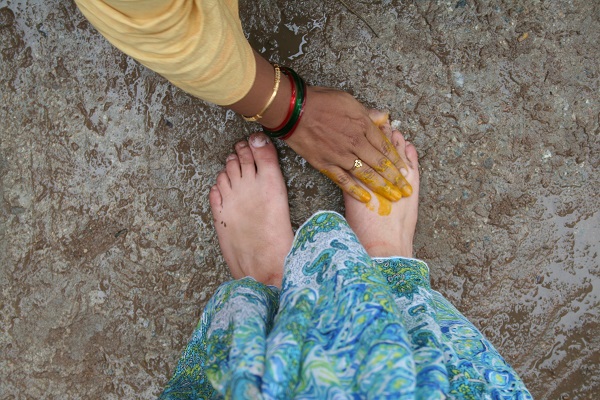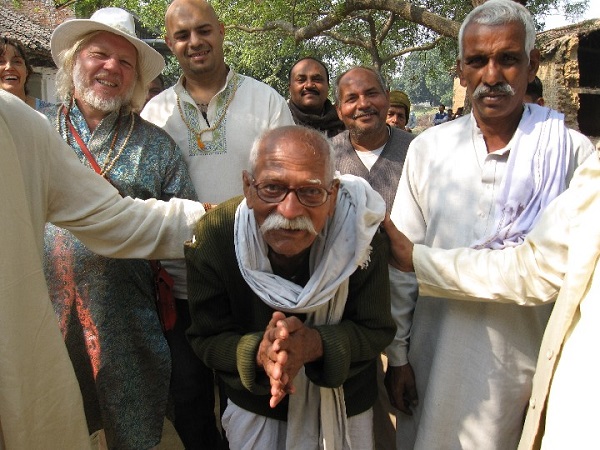Small talk can help pass a minute of your time, or do something more momentous, like forge a lifelong friendship.
by Shweyta Mudgal
 Previously, when someone would casually ask me, “Where are you from?” I would often be left puzzled or flattered.
Previously, when someone would casually ask me, “Where are you from?” I would often be left puzzled or flattered.
Puzzled, because a certain part of me went, “Duh? Isn’t it obvious?” for it didn’t take rocket science to decipher my Indian features and skin colour. And flattered, because it was nice to know that for someone, I could pass off as a non-Indian as well.
To me, strangers that usually ask these questions fall under the following categories:
1. Those who are ignorant of India and hence do not know what Indians look like (yes, in spite of how famous we are, there are still some corners of the world where the desi tourist hasn’t ventured as yet, and people do not know what an average Indian looks like. Or even if they do, then thanks to Bollywood, they think all Indian women look like Aishwarya Rai or Kareena Kapoor; both representatives of a marginal population.)
2. Those who genuinely wonder, at my mixed-up accent, if I am an Indian who has lived in America for a few years or a pseudo-desi living in India, who’s merely hurling slang and rolling her R’s because she is trained like that at a desi call centre. (A friend’s father, who obviously did not know that I’d been living in NY and was only visiting Mumbai, once thought I was talking the way I did because I worked at a local call centre in Mumbai.)
Bringing me the utmost delight are instances when someone mistakes me to be Hispanic; a frequent misnomer that occurred with me often in the States. This assumption is largely based on the fact that when posed with any question in Spanish, I always confidently reply with a, “Yo no habla Espanol, (I do not speak Spanish)”, a habit the best friend, now a San Diegan for years, inculcated in me when I was fresh-off-the-boat in La La Land. The fact that I’ve answered in Spanish, convinces the asker of the question that I speak the language and am Hispanic myself, even though what I’ve really told them is I do not speak their language.
3. And lastly, there are those that use the question, “Where are you from?” as an ice-breaker, after the conventional, “Hi, how are you? What do you do?” etc for the lack of anything else to say or ask when introduced randomly at a party/gathering of any kind.
It is the last kind of “Where are you from?” that I am going to write about today. The non-loaded, innocently-asked question, generally asked of “newly-mets” that represents small talk!
Small Talk has been described as a brief conversation, usually made between strangers, regarding the most general and banal topics such as the weather, sports, TV/movies etc. More often than not, this serves as a conversation starter between two people co-habiting a space for a temporary period of time – such as when riding an elevator or while waiting for one’s car to be brought out by the valet.
The concept of small talk never really entered my life until I left Mumbai to move to the States, way back in 2002. I was in my early 20s then and always running late for everything. So naturally, any acquaintances that I ran into rarely got anything more than a rushed “Hello” from me. Besides, in Mumbai, one didn’t really talk to people one didn’t know, and so naturally there was no place for unnecessary chit-chat with strangers just because one was packed into an elevator with them.
America, on the other hand, is the mecca of small talk. One finds small talk everywhere you go in this nation – from a cab to a cube. Even the waitress at your table insists on first knowing how you are doing, when all your famished self would rather do is have her get you the usual No. 20 on the menu. Americans who you have just met and will probably never again cross paths with in your entire life, are always asking you, “How’s it going?” and “What’s up with this weather?”
No, they don’t really care to hear that it’s not going as well as it should, or what your take on this sudden snowstorm is. What they are really trying to do is, for the lack of a better word, ‘unawkwardify’ a moment, for the time in transition in which they are sharing space with you. Because to them, riding up 40 floors in an elevator in complete silence with another stranger might just seem uncomfortable and unbearable.
Usually a pet or a baby with their growl or gurgle respectively work wonderfully as instant catalysts for meaningless chatter, meant to serve only as an accompaniment to the long wait of reaching one’s destination. When one doesn’t have either, usually the weather can help – although that is only relevant in countries where the weather is something to talk about on account of its daily dynamism, always making it the opening conversational gambit. In the Northeast United States, one can at least say, “Wow, it’s freezing out there!” or “Whoa! That rain came down from nowhere.” In Singapore, what would one say? “Wow, look at the rain,” every single afternoon? Or “Hmm…it’s so hot!” for all 365 days of the year?
When people are acquaintances, co-workers or even ‘random-meeters’ who bump into each other all the time, the reference frame for small talk broadens. Now, one can advance from the mundane topics of weather and meaningless chatter on to more meaningful talk or gossip, even things like, “That’s a lovely dress,” or “What’s wrong with the Boss these days?” Familiarity provides one with a wider context thus helping breed slightly more meaningful and relevant conversations.
Small talk at the office, however, could be dangerous as well, especially between workers at different levels, say a boss and his staff, for example. While at times it can help ease working relationships between them, it can also occasionally masquerade itself as a motivational tool used by ‘friendly’ managers to leverage a working weekend, from say, staff that reports to them. Because after all, it is the superior who has the power to close the small talk and “get down to business”. (“Yeah, it’s good to know you’re not doing much this weekend. Maybe you can come in for a few hours and wrap up that report?”)
In social situations such as parties or informal gatherings where people who you’ve never met before come together, small talk can help create networks, forge alliances and foster long-lasting friendships. Whether you want to use it to make your way through the next three hours of the party or the next three decades of your life, is then is entirely up to your discretion.
Most friends you’ve made as yet, other than those that fall in the ‘childhood BFF’ category, are strangers you small-talked with the first time you met them. At school or at work, in a class or a cafe, in a train or a bus or wherever else it is that you meet people, it is through small talk that most of our non-familial relationships have walked into our lives.
Small talk naturally varies across cultures, with different mores and taboos. Americans use it as a mechanism for opening channels of communication by talking about the weather, how you’ve been, the economy and politics – but stay away from salaries or how much your house cost. Indians, on the other hand, can use it as a Q&A session to get to know the person they are dealing with (and his past few generations, if you let them). For example, in the scenario of a professional partnership between an American and an Indian firm, it is not uncommon to find the American employee partly startled-partly amused at being posed with personal questions about his/her family, usually asked by the Indian business partners to forge good personal relationships that, to them, are important precursors to good professional relations.
Yet, it is in the Asian workplace – which has more formal rules for communication and lays a strong emphasis on social hierarchy – that it is considered inappropriate to engage in casual conversation with one’s superiors. In addition, freely expressing one’s opinion during small talk, especially if it could potentially conflict with that of their colleague’s or boss’s, might also come across as impolite conduct. Expressing one’s allegiance towards a particular team or a differing point of view about any other topic might put one in the uncomfortable position of having to suppress their own preference, just to avoid serious conflict.
In some Asian cultures, small talk may come across as intrusive; bordering on nosey and downright rude even. In vain Vietnam, a random shopowner unknowingly threw salt on my wounds, when she harmlessly wondered out loud, in the middle of a market place, if I’d had a C-Section baby, on account of the slight ‘pouch-like’ appearance of my lower abdomen? My aghast yet truthful response to her was a quick nod of the head in the affirmative, as I sucked my tummy in while holding my breath and walking away, vowing to double-up on the number of daily abdominal crunches at the gym then on.
In Thailand, one may perhaps be taken aback at the directness of some questions asked by the locals to tourists. What may be considered impolite in another country is often perfectly normal here. Food, family and social hierarchy are very important, consequentially making small talk around these themes perfectly acceptable. Often, conversations will consist of many questions that enable social categorisations of each other. I personally have smilingly answered queries regarding our family income, what my iPhone cost and when (not ‘if’) I am having Baby no. 2.
Small talk – whether you love it or hate it – is an essential part of meeting, conversing and getting to know people. Any intrepid vagabond can tell you that while travelling, it is the easiest way to understand a new culture through assimilation into the daily life of a foreign land and overcoming our inbred distrust of anyone outside the tribe. In the workplace, interpersonal impressions often created through small talk matter a great deal along the way, and can even shape how people judge each other. In social life, it can escalate random chance meetings into greater associations, such as business partnerships, life-long friendships and perhaps even temporary or permanent romantic alliances. And in the elevator or a building lobby, if nothing else, it can help set the tone for a great start or end to your work day.
In today’s age, when phones, iPads, headphones and other self-encapsulating mechanisms have alienated us from our travel surroundings, go ahead and take a few minutes out of your daily commute to talk to others. Chat up the person next to you on the bus, in the train or in the elevator, even. Ask them how things are going. If in Mumbai, offer them a sounding board to voice their traffic troubles. You might just pick up a carpool ride back home in the process. If in New York City, let them warn you of the impending snowstorm that you weren’t aware of, so you’ll be ready for it when it comes. If in Singapore, be thankful and nod each time your doorman and taxi driver remind you to check if you’ve taken your passport along as you walk out with a suitcase. And if in Thailand, just smile at what might seem like a volley of the third degree coming your way. After all, if you’re ok with virtual small talk – answering Twitter’s “What’s happening?” and Facebook’s “What’s on your mind?” so many times in a day, what harm can striking up a round of deep-and-meaningless with the people you meet along the way, do?
A Mumbaikar by birth and a New Yorker by choice, recently-turned global nomad Shweyta Mudgal is currently based out of Singapore. An airport designer by day, she moonlights as a writer. ‘Outside In’ is a weekly series of expat diaries, reflecting her perspective of life and travel, from the outside-in. She blogs at www.shweyta.blogspot.com and as is obvious, always has a lot to talk about!




